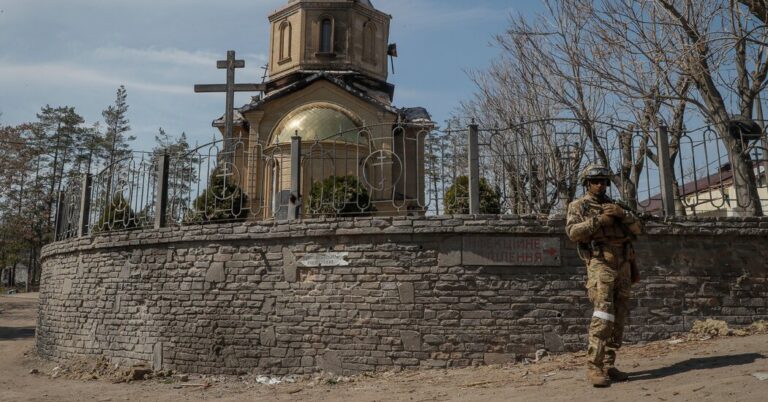Two Russian soldiers have been detained in connection with the killing of nine people, including two children, in Ukrainian territory controlled by Moscow, Russian authorities said, in a rare admission that occupying forces may have committed a crime against Ukrainian civilians.
The killings, which were also reported by Ukrainian officials, took place last week in Volnovakha, a small city in southeastern Ukraine that was seized by Russian forces shortly after the start of their full-scale invasion last year. Russian federal investigators said in a statement late Monday that nine bodies with gunshot wounds had been found in a house.
Russian authorities did not provide details of the killings, saying only that they involved a “conflict on domestic grounds.” Nor did they shed light on a potential motive. Ukrainian officials said they believed Russian soldiers had murdered an entire Ukrainian family for refusing to hand over their house.
Ukrainian officials, prosecutors and human rights groups say that Russian occupation forces have regularly committed atrocities against Ukrainian civilians over the course of Moscow’s 20-month invasion. They include executions of people in the street, torture of local residents and rape of women.
But these crimes have usually come to light only after the liberation of the occupied territories by Ukrainian forces, and Moscow has long denied any responsibility for them, typically saying its soldiers do not brutalize civilians. The fact that Russian authorities have now publicly announced the opening of an investigation into a killing in occupied territory raises questions about their motivation for doing so, said Tetyana Katrychenko, the head of the Media Initiative for Human Rights, a group investigating Russian crimes in Ukraine.
She said Russian authorities “had to announce the investigation about this case” because pictures of the bodies quickly started circulating on social networks, putting occupying forces under public pressure.
But Ms. Katrychenko and other experts questioned whether Russian investigators would actually try to solve the case, and they warned that the investigation may only be intended to give the impression that Moscow is concerned about crimes against civilians.
Images released yesterday by the Ukrainian prosecutor’s office in the southeastern Donetsk region showed a gruesome murder scene, with several people shot dead in their beds, some still locked in an embrace, and blood splattered on the walls.
The prosecutor’s office said that, earlier this month, people wearing Russian army uniforms had demanded that the family vacate their house to accommodate a Russian unit. After the owner of the house refused, the soldiers physically threatened him and left. But it added that they returned days later and “shot all nine members of the family, who were already asleep at that time.”
The Ukrainian prosecutor’s account could not be independently verified.
Ukrainian news organizations gave a similar version of events, before the prosecutor’s statement was released. ASTRA, an independent Russian news channel, quoted neighbors of the victims blaming a Russian serviceman for the killing.
The Investigative Committee of the Russian Federation only said that preliminary information indicated that “the motive of the crime was a conflict on domestic grounds.”
The committee added that two soldiers from Russia’s Far East who had signed contracts with the Russian military had been arrested in connection with the killing. “Investigative and procedural actions are being taken to establish all the circumstances of the incident,” it said.
Moscow has almost always flatly denied any responsibility for acts of brutality by its soldiers. That includes the well-documented street executions of residents in Bucha, near Kyiv, in which Russia claimed that the images of bodies lying in the street were fake.
Mikhail Savva, a member of the Kyiv-based Center for Civil Liberties, said the investigation into the killing in Volnovakha was an extremely rare case of Russian authorities implicating their own forces in a crime against civilians. But he said that it was likely a way of feigning concern about the fate of civilians, while ignoring the many other crimes Russian forces have committed.
“Currently, the Russian information campaign about this case is built on the idea that this is a random act by the executant,” Mr. Savva said. “It fits into their strategy of pretense.”
News of the killing has pierced the fog that usually shrouds what is happening in the Russian-occupied areas of Ukraine. These regions are largely inaccessible to international organizations, which has complicated independent investigations and fueled fears that the millions of people living there are at risk of human rights abuses.
Russia’s invasion of Ukraine has taken a heavy toll on Ukrainian civilians, who have been killed while caught up in urban fighting, during extrajudicial executions or under bombardment targeting civilian infrastructure.
The United Nations said in a statement on Tuesday that it had “reasonable grounds to believe” that a missile strike on a wake that killed nearly 60 civilians earlier this month was launched by the Russian military. The total number of civilians killed since the start of the invasion has reached nearly 10,000, the United Nations said.
Daria Mitiuk and Maria Varenikova contributed reporting.

